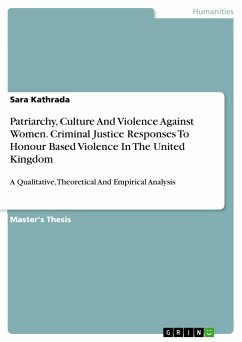Master's Thesis from the year 2014 in the subject Sociology - Law, Delinquency, Abnormal Behavior, grade: Distinction, Liverpool John Moores University (School of Law), course: Criminal Justice, language: English, abstract: This thesis employs qualitative methods to examine the subjective experiences of 9 South Asian females in the United Kingdom, all with varying exposure to honour based violence and the criminal justice system. Recurrent themes emerge from their accounts to suggest that abusive acts arise out of a multiplicity of cultural circumstances influenced by power and gender relations. Interdisciplinary theoretical analysis in criminology, criminal justice, sociology, law, cultural studies, psychology and political science compliment the research, with the interplay between contradictory discourses neo-liberalism and neo-conservatism demonstrating how the volatile and pensive climates of multiculturalism embedded in contemporary issues of terrorism, sexuality and patriarchy, fracture social relations in the dichotomy of belonging and identity. The notion of honour is explored, seen both as a tool to constrain women's independence and as a catalyst for violence when notions of family and community norms are challenged. Case descriptions from the UK are employed to illuminate how the concept of honour is used in practice, as well as highlighting problems with accountability and the lack of civil and criminal remedies that fail to provide women with adequate protection whilst covertly legitimating male violence. Recommendations include holistic responses in the provision of training for criminal justice bodies, the creation of guidelines and legislation specific to honour based violence, and the development of specialist voluntary services.
Hinweis: Dieser Artikel kann nur an eine deutsche Lieferadresse ausgeliefert werden.
Hinweis: Dieser Artikel kann nur an eine deutsche Lieferadresse ausgeliefert werden.








